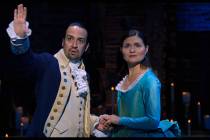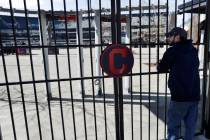Dark, seedy soul of ‘Breaking Bad’ lives on vibrantly in ‘Better Call Saul’
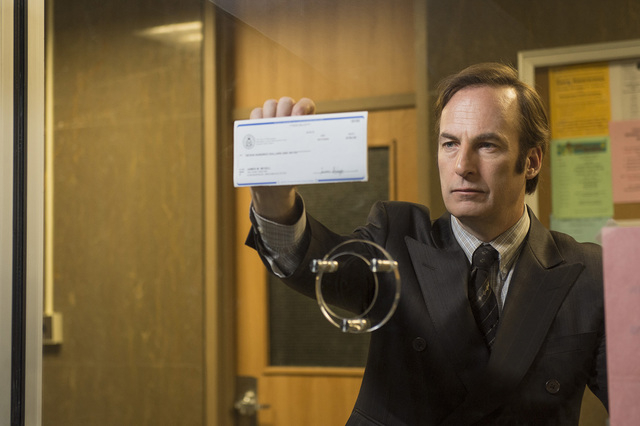
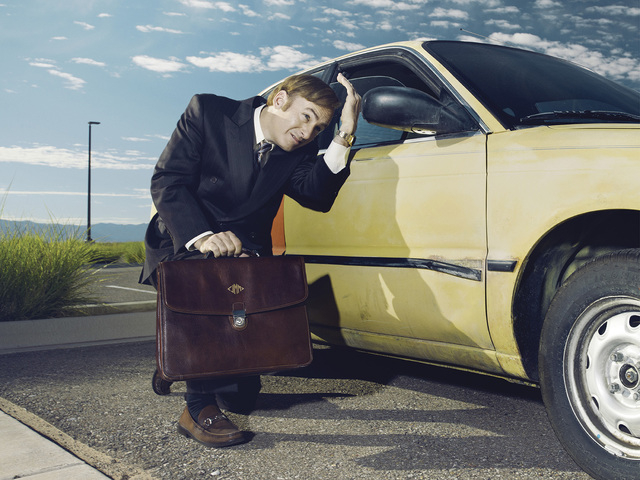
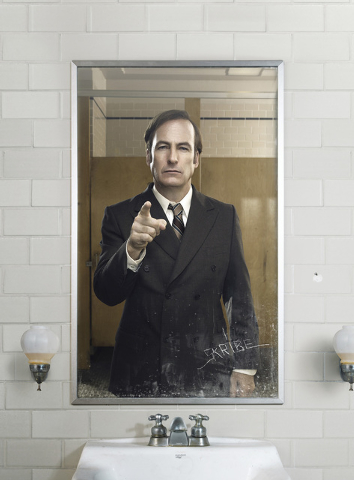
At least one person who crossed paths with Walter White got what he was hoping for at the end of “Breaking Bad.”
Last seen fleeing Albuquerque, N.M., in the penultimate episode, lawyer Saul Goodman (Bob Odenkirk) had a rather pragmatic view of what lay ahead: “If I’m lucky, in a month from now, best-case scenario, I’m managing a Cinnabon in Omaha.”
That’s exactly where we find him in the opening moments of the spinoff, “Better Call Saul” (10 p.m. Sunday and Monday, AMC).
Wearing a “Gene” name tag, he’s operating the mixer, kneading dough, cleaning tables and always, always looking over his shoulder. It’s a wordless, three-minute scene, set to The Ink Spots’ “Address Unknown.” And it’s filmed in black and white. Because, as Alexander Payne showed us in “Nebraska,” that’s just how things look in the Cornhusker State.
But that, and a similarly brief, sad glimpse at his home life, are all we see of “Gene” in the first three episodes.
“Better Call Saul,” created by “Breaking Bad” mastermind Vince Gilligan and Peter Gould, who wrote the episode that introduced Saul, focuses on the character’s colorful life in 2002 as struggling Albuquerque lawyer James J. McGill.
Thankfully, the spinoff feels very much of a piece with “Breaking Bad.” The same visual flair is there. It even shares the latter’s enthusiasm for crappy cars with broken windshields.
But mostly, it captures the original’s blend of seediness and dark humor, with the occasional moments of pants-soiling terror.
The seediness? Jimmy’s law office is upstairs from a nail salon. It’s an awful space, next to a washing machine, where he works from a cheap desk chair wedged beside a water heater.
The dark humor? Few people can downplay a crime as hilariously as Odenkirk. Characterizing the actions of his three public defense clients as “a momentary, minute, never-to-be-repeated lapse of judgment” from fine young men who were “feeling their oats one Saturday night and they just went a little bananas,” Jimmy makes a compelling case. At least until the prosecutor, without saying a word, wheels a TV in front of the jury to show the video they recorded of that judgment lapse in all its gruesome horribleness.
As for the terror, well, just because Gilligan and Gould have said Walt and Jesse won’t turn up this season, that doesn’t mean viewers won’t see any other familiar faces.
Used primarily as comic relief in “Breaking Bad,” Saul/Jimmy has been fleshed out for “Better Call Saul.” He’s still a fast-talking hustler, as evidenced by his wistful stories of his days as Slippin’ Jimmy, the slip-and-fall king of Cicero, Ill. (Although it would have prevented Odenkirk’s involvement, I’d have looked forward to that series, too.)
He’s just deeper, more conflicted and much more human, as evidenced by the way he cares for his brother, Chuck (Michael McKean), a prestigious attorney in the throes of an unusual illness.
No one’s expecting “Better Call Saul” to be another “Breaking Bad.” A million monkeys on a million typewriters smoking a million rocks of blue crystal meth could never come up with another “Breaking Bad.”
It’s one of the all-time greats.
But “Better Call Saul” is a worthy successor, one that keeps the spirit of Heisenberg’s world alive without diminishing it.
Contact Christopher Lawrence at clawrence@reviewjournal.com or 702-380-4567.




